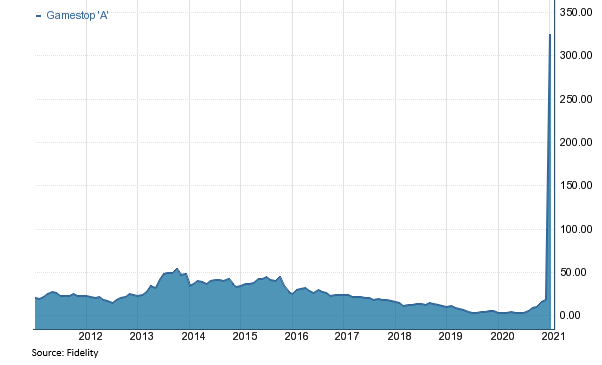
StonebridgeFOCUS | Gamestop & Meme Stocks
Word to the wise, don’t mess with Reddit. Over the last week, perhaps the most interesting storyline in financial markets was not Elon Musk changing his Twitter bio to Bitcoin, or Q4 economic data starting to roll in. No, it was Gamestop. The company notorious for shortchanging gamers when selling their used copies of videogames became the darling of Reddit-traders earlier this week. What started as a search for undervalued companies on Reddit evolved into a coordinated effort to punish hedge funds that have heavily shorted the stock for years. In other words, betting against a decline in share price. The result was a skyrocketing stock price and a lesson in how commission-free trading and social media may impact financial markets going forward.
Full disclosure, I don’t own Gamestop. Why? For starters, the brick and mortar down the street from our offices is going of business and, prior to this past week, the conversation regarding Gamestop was largely based on their expected bankruptcy. The dismal outlook for Gamestop is what made a short sale of their stock appealing to larger hedge funds. In fact more than 100% of their outstanding shares were being shorted prior to this week.
In laymen’s, a short sale is effectively a bet that the price of a stock will go down. If the price goes down, you make money. If the price goes up, you lose. The massive gains we’ve seen in Gamestop over the last few days largely resulted from hedge funds closing out their short positions due to increased losses from Reddit-traders pushing the price higher. Because these funds were so heavily shorting the stock, it didn’t take much effort from the Reddit-trader community to push this teetering boulder over the cliff.
While a hedge fund capitulating to the trades of a subreddit is interesting, what is probably more intriguing is seeing how markets may change based on a generation of young people who grew up on the internet where barriers to markets were not only removed, but “free”. These dynamics are the culprit for a new type of stock classification at work: a meme stock.

I don’t think Merriam-Webster has weighed-in on defining “meme stock” just yet, they are broadly defined as companies popular with younger demographics, typically overvalued based on the fundamentals (i.e. company’s financials), significant volatility based on FOMO (fear of missing out), panic selling (when any bad news comes out), and most importantly, the idea of valuation is near the bottom of the list. Think Nokia, Blockbuster (yes, you can still buy BB Liquidating Inc., the final remnant of bankrupt video-rental company Blockbuster), and most recently, Gamestop. The rise of meme stocks started within social media circles, but took off once broader access to markets become available through commission-free trading.
The rise of commission-free trading, and platforms like Robinhood, have made it easier than ever for retail investors to participate in markets, which should be considered a good thing. Getting more people to participate in financial markets is a way to reduce the wealth gap. But as the saying goes “there’s no free lunch.” Everything has a cost. Even commission-free trading isn’t really free. Between money-market spreads and selling order flow, the lost revenues from commissions are just captured elsewhere. But, that’s not really the cost of commission-free trading. The cost may ultimately be increased inefficiencies and a rise in “microbubbles”.
Over the past few years we’ve seen more and more research come out regarding the behavioral and psychological effects of social media. I suspect we’ll also see some interesting research on the influence of social media and commission-free trading on financial markets. More than likely these types of events will be microcosms that have no material impact on the broader market. Look no further than how the S&P performed this week. It’s certainly possible to see increased inefficiencies in markets that were otherwise considered to be efficient.
No one knows how this saga will end with Gamestop. There are certainly people cheering on both sides. The day-traders from Reddit are certainly happy to force steep losses on hedge funds, but what gets overlooked are other retail investors who likely lost a lot of money because of trading restrictions put in place on platforms like Robinhood, Schwab, or TD Ameritrade. Ironically enough, BlackRock, one of the largest investment managers on the planet, owned about 9.2m shares of Gamestop as of December 31. It’s possible that they raked in over $1B due to this week’s action. The point is that it’s easy to cheer for the “little guys” in this instance, but there’s always more to the story.
At Stonebridge, our foundational investment philosophy is rooted in research and delivered through institutional solutions. Our strategies are not based on what’s trending on Twitter, or the most up-voted idea on a subreddit. In our experience, a goals-based approach leads to the best long-term outcomes, where success is not determined by luck, or once-in-a-lifetime trade, but due to a disciplined and well defined strategy that emphasizes your goals and values.

